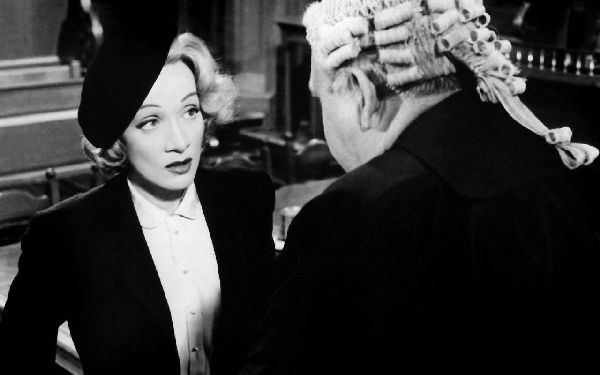Witness for the Prosecution (1957) 
“Unmatched …in a half century of motion picture suspense!”

Director: Billy Wilder
Cast: Tyrone Power, Marlene Dietrich, Charles Laughton
Synopsis: Leonard Vole is arrested on suspicion of murdering an elderly acquaintance. He employs an experienced but aging barrister as his defense attorney.
WARNING! — This Review Contains Spoilers!
Witness for the Prosecution is a Billy Wilder movie that often gets overlooked when looking back over his body of work. Overshadowed by the likes of Sunset Boulevard, Some Like it Hot, The Apartment et al., it rarely receives the praise it is due, which is, perhaps, a testament to the quality of Wilder’s work in general. Having said that, Witness for the Prosecution does contain weaknesses that perhaps prevent it from being a bona fide classic, and it possesses a staginess that belies its source material and has resulted in it dating far less well than much of Wilder’s other work.
Charles Laughton plays Sir Wilfrid Robarts, an eminent and brilliant defence barrister returning to work after recovering from a heart attack. Repeatedly ignoring the instructions of his officious nurse (Elsa Lanchester — Laughton’s real-life wife), Robarts takes on the case of Leonard Vole (Tyrone Power), a former soldier who is now unemployed. Vole is accused of the murder of wealthy spinster Emily French (Norma Varden) in order to benefit from an inheritance of £80,000 she left him in her rearranged will. Vole strenuously denies the charges, and relies heavily on the evidence of his German wife Christine (Marlene Dietrich), who initially confirms his alibi, but later retracts it and, during the Old Bailey trial, testifies as a witness for the prosecution against her husband (She’s able to do this because, unknown to Vole, she was already married when they wed and so is not legally his wife).
Witness for the Prosecution delivers some solid entertainment, and has a genuinely unexpected twist at its conclusion (together with a horribly melodramatic one as well). It’s this strange inability of the film to maintain a consistent tone that really does for it in the end. Too often, the serious part of the story is set aside for a few comical interludes involving Nurse Plimsoll’s futile attempts to bully Robarts into following his recuperation regime of lukewarm baths and afternoon naps which simply aren’t funny. Much more successful as comedy is the testimony of Janet McKenzie (Una O’Connor), the murder victim’s disgruntled former housekeeper, who found herself shunted aside in the old lady’s will by Vole.
The trial sequences are proficiently handled without ever serving up any major shocks (until the twist ending), and the verbal jousting between Laughton and Torin Thatcher (as the prosecutor) is enjoyable, but much of this enjoyment is tempered by some poor acting from both Dietrich and Power. Many cite this as Dietrich’s best screen performance, and well it might be. But that particular bar isn’t set too high to start with, and while she’s ok when in restrained mode, she’s truly excruciating when it comes to emoting. But then, Dietrich was never one of my favourite actresses. Too often, she would deliver her lines in a dreary monotone that is supposed to be alluring, but which simply irritates.
Tyrone Power was never an acting giant either, but he was capable of much better performances than he delivers here. It’s just conceivable that his melodramatic overacting during the trial sequences are deliberate as his character is lying and thus only acting the part of an innocent man, but if that’s the case he still goes well over the top. Thankfully, Charles Laughton is on hand to provide a bit of class to the proceedings; his turn as the eminent barrister reduced to playing schoolboy tricks in order to partake in a little of what he likes is a real gem and goes a long way towards making up for the hammy histrionics of his co-stars.
(Reviewed 1st January 2013)
httpv://www.youtube.com/watch?v=deW1WD_iFpk
